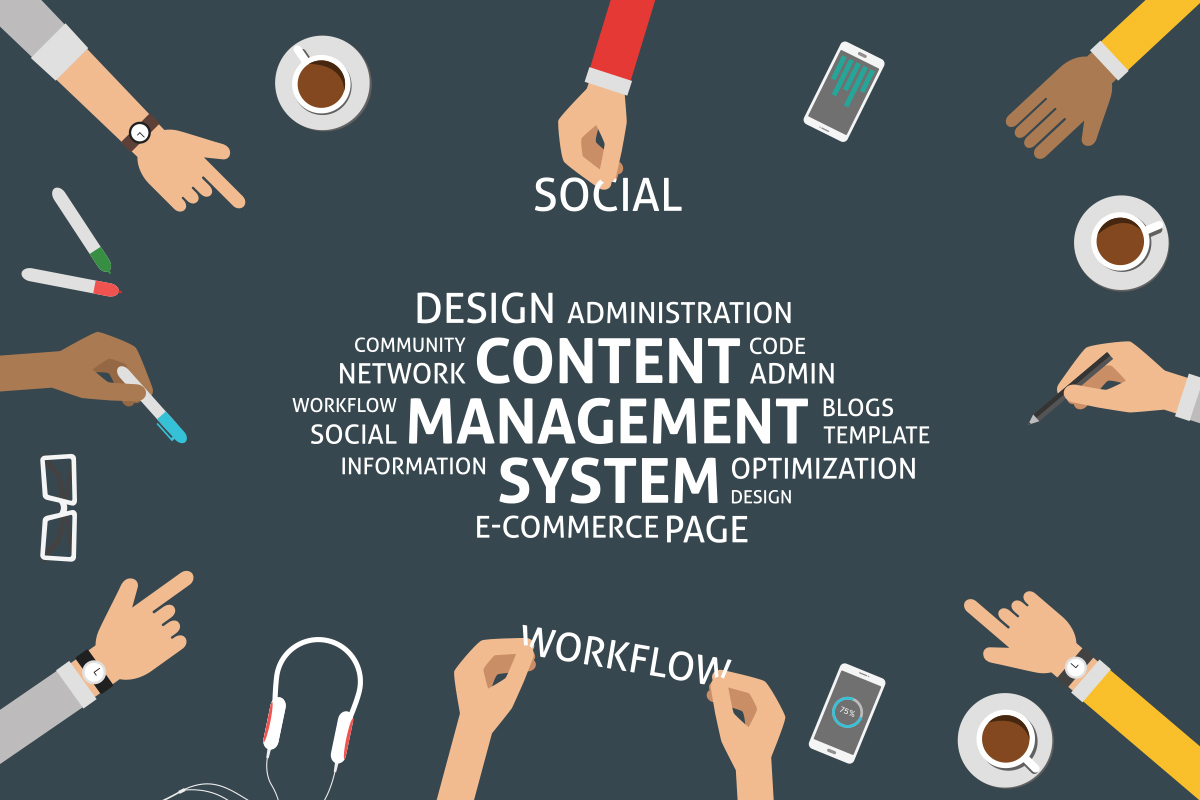As the web evolves and more devices with access to the web pop-up everyday, it has become vital for business and website owners to be able to make updates on their website. In the early days of the internet, a business owner would have to call their webmaster every time they wanted to make a simple change to the website. Nowadays, one of the most commonly used web development tools, Content Management Systems, can be easily implemented into any design and allow business owners to take control of their website updates.

What is a Content Management System “CMS”?
A Content Management System is a computer program that allows users to easily edit, modify, and publish changes from a central interface. CMSs are commonly used to run websites that contain news, blogs, and ecommerce components. The goal of most CMSs is to avoid hand coding changes and to allow users to dynamically populate content to different sections of a website.
Choosing the right CMS for your website
First make a list of your site’s requirements and have it ready to review against each CMS option as you go through the selection process.
10 Tips to help choose the right CMS for your website
- Core FunctionalityBefore selecting a CMS be sure to consider all core functionality and features your project will require. In researching each CMS check to see if it can meet ALL of your requirements. If the CMS can handle all of our required functionality it should be further researched.
- The EditorMost CMSs feature a WYSIWYG (What You See Is What You Get) editor. These editors typically have a similar look to the top bar in Microsoft Word. They typically will allow a novice user the ability to ‘easily’ create new pages and format content. Be sure to take the editor for a test drive before investing in a CMS.
- Managing Images/Videos/Files/EtcEvery CMS has a different way of managing and storing images, videos, and other file types in their databases. Be sure to investigate how your files will be stored, how much storage you have, and how easy it is to upload and change files in the CMS.
- CustomizationSome CMSs will allow you to customize the base code while others have their code on lock down. Make sure to understand all the limitations on your potential CMS.
- User experienceBefore selecting which CMS to go with be sure to test the back-end interface and make sure the user experience is easy to use. The last thing you want to have happen after making a large investment in a powerful CMS is getting stuck with an admin interface that is too hard to use.
- Administration settingsMost CMSs have the ability to set administrator privileges for each user that will have access to the admin panel. It is important that you make sure a user can easily be removed or not have access to certain sections. You may have to let an employee with access to your CMS go or may want another to only have access to the blog or store section of your CMS. Ensure you can control what people access and update within each CMS.
- VersioningA helpful feature for many businesses that is available within some CMSs is the ability to archive and rollback changes. If an admin user makes a mistake and publishes false information, breaks the pages code, or just has a simple typo the changes can be reverted back to their original state. Also, if your site gets hacked or a server goes down – having backups of your entire site will give you the security that you need to not worry about anything going wrong your investment.
- Software Updates Every CMS can’t do everything, however, most CMSs are constantly improving and pushing out updates to their software to add enhanced features for their users as well as fix bugs within CMSs. Before selecting a CMS, investigate how often updates are released and how they are delivered. Make sure to understand if you will be responsible to install updates regularly or if they are web-based and pushed directly to your CMS.
- Helpful user community ‘Google’ the CMS you are thinking about selecting and research how big and more importantly how helpful is the user community. More than likely you will run into roadblocks with your CMS once you get into your project and having a strong user community to get helpful resource information and to run ideas against will become your best asset. If you Google a CMS and there is little to no results be wary before making the selection.
- PriceUnfortunately the main factor in selecting the right CMS for you is often ultimately price. When making your selection price will always play a factor but try to look at each CMS independent of price prior to making your selection. With so much competition and intelligent existing CMS users out there – the best advice I can give is you typically get what you pay for.
